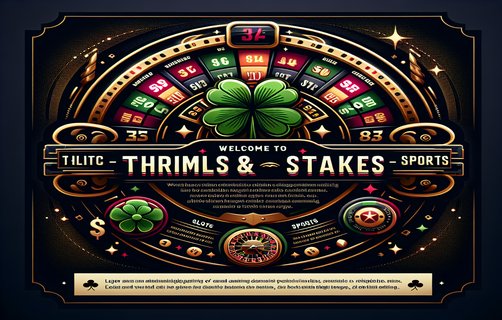Mastering the Game: Strategies for Winning at Poker
पोकर में जीतने के लिए रणनीतियाँ


Poker is more than just a game of chance; it’s a battlefield of strategic thinking, psychological warfare, and mathematical probabilities. Understanding the fundamentals of poker—such as stake adjustment, long-term return management, and mental fortitude—can significantly enhance a player's success. Each session at the table provides players with an opportunity to refine their skills and adapt to the ever-changing dynamics of the game.
The concept of stake adjustment is crucial for any serious poker player. It encompasses the ability to modify your betting style and the size of your bets in response to the table’s environment. For example, in a loose game where players are calling large bets, a tighter strategy may yield better returns, allowing you to take advantage of opponents’ mistakes. Conversely, if the game is tight and players tend to fold more often, adapting to a more aggressive strategy can open up opportunities for stealing blinds and accumulating chips. Mastery in stake adjustment can lead to maximizing profits, adjusting to the skill level of opponents, and understanding when to risk more or hold back.
Long-term returns management is another integral part of successful poker play. It involves not just tracking wins and losses, but analyzing the players’ strategies and behaviors over time to understand patterns. This data-driven approach allows for informed decision-making regarding bankroll management. It’s essential to keep records of every game, every hand—this diligence can be time-consuming, but it pays off in the long run, as players can identify what works and what doesn’t. Effective long-term management is about hitting the sweet spot between aggressive play and cautious spending within the game.
Error prevention is a skill that often gets overlooked. Entering the game with a well-crafted strategy is great, but deviating from that plan due to emotional responses often leads to costly mistakes. To combat this, players should establish a set of guidelines for themselves, including rules for when to fold or raise aggressively. Additionally, self-discipline must be practiced to prevent tilt—a state of emotional frustration and confusion leading to poor decisions. Similarly, taking breaks between hands or sessions can refresh a player’s mind and help maintain a level-headed approach.
Mental fortitude is perhaps one of the most critical aspects of playing poker. The ability to stay calm under pressure, handle losses gracefully, and make consistent decisions regardless of the game’s outcome showcases true poker prowess. Developing resilience through practice and experience allows players to embrace both victory and defeat with equanimity. Good mental health practices, such as mindfulness and meditation, can also contribute to a stronger mindset during gameplay, enhancing focus and decision-making.
In conclusion, poker is an intricate game requiring a blend of skill, patience, and discipline. Those who dedicate themselves to mastering stake adjustment, long-term returns management, error prevention strategies, and mental fortitude are likely to experience continued success at the poker table. Each element is interconnected, playing a vital role in overall performance. As players continue to navigate through complex card deals and varying game conditions, it’s essential to apply these strategies efficiently and adapt to the evolving poker landscape. Success lies not only in the cards dealt but in the player's ability to respond strategically in any situation.
पोकर केवल एक मौका का खेल नहीं है; यह रणनीतिक सोच, मनोवैज्ञानिक युद्ध, और गणितीय संभावनाओं का युद्धक्षेत्र है। पोकर के मूलभूत तत्वों को समझना—जैसे कि दांव समायोजन, दीर्घकालिक रिटर्न प्रबंधन, और मानसिक दृढ़ता—खिलाड़ी की सफलता को अत्यधिक बढ़ा सकता है। टेबल पर हर सत्र खिलाड़ियों को अपने कौशल को परिष्कृत करने और खेल की लगातार बदलती गतिशीलताओं के अनुकूल बनने का एक अवसर प्रदान करता है।
दांव समायोजन की अवधारणा किसी भी गंभीर पोकर खिलाड़ी के लिए महत्वपूर्ण है। इसमें आपके बेटिंग शैली को संशोधित करने और दांव के आकार को टेबल के वातावरण के जवाब में बदलने की क्षमता शामिल है। उदाहरण के लिए, एक ढीली खेल में जहाँ खिलाड़ी बड़े दांव को कॉल कर रहे हैं, एक संकीर्ण रणनीति बेहतर रिटर्न दे सकती है, जिससे आप विरोधियों की गलतियों का फायदा उठा सकते हैं। इसके विपरीत, यदि खेल तंग है और खिलाड़ी अधिकतर फोल्ड करते हैं, तो एक अधिक आक्रामक रणनीति अपनाना ब्लाइंड चुराने और चिप इकट्ठा करने के अवसरों को खोल सकता है। दांव समायोजन में महारत से लाभ अधिकतम करना, विरोधियों के कौशल स्तर के अनुसार समायोजन करना, और यह समझना कि कब अधिक जोखिम उठाना है या कब रुकना है, में मदद मिलती है।
दीर्घकालिक रिटर्न प्रबंधन सफल पोकर खेलने का एक और अभिन्न हिस्सा है। इसमें केवल जीत और हार को ट्रैक करना शामिल नहीं है, बल्कि खिलाड़ियों की रणनीतियों और व्यवहारों का समय के साथ विश्लेषण करना भी शामिल है, जिससे पैटर्न को समझा जा सके। यह डेटा संचालित दृष्टिकोण जिम्मेदार बैंक रोल प्रबंधन के लिए सूचित निर्णय लेने की अनुमति देता है। खेल के हर हाथ, हर खेल को दर्ज करना आवश्यक है—यह मेहनत लग सकती है, लेकिन यह लंबे समय में फलदायी साबित होती है, क्योंकि खिलाड़ी यह पहचान सकते हैं कि क्या काम करता है और क्या नहीं। प्रभावी दीर्घकालिक प्रबंधन आक्रामक खेल और खेल के भीतर खर्च को नियंत्रित करने के बीच संतुलन बनाने के बारे में है।
त्रुटि रोकथाम एक कौशल है जिसे अक्सर नज़रअंदाज़ किया जाता है। खेल में एक अच्छी तरह से तैयार की गई रणनीति के साथ प्रवेश करना अच्छा है, लेकिन भावनात्मक प्रतिक्रियाओं के कारण उस योजना से भटक जाना अक्सर महंगे गलतियों का कारण बनता है। इसे रोकने के लिए, खिलाड़ियों को अपने लिए एक सेट दिशानिर्देश स्थापित करने चाहिए, जिसमें फोल्ड या आक्रामक रूप से वृद्धि करने के लिए नियम शामिल हैं। इसके अलावा, टिल्ट—भावनात्मक निराशा और भ्रम की स्थिति जो खराब निर्णयों की ओर ले जाती है—से बचने के लिए आत्म-अनुशासन का अभ्यास करना आवश्यक है। इसी प्रकार, हाथों या सत्रों के बीच ब्रेक लेना एक खिलाड़ी के मन को ताज़ा कर सकता है और चतुर दृष्टिकोण बनाए रख सकता है।
मानसिक दृढ़ता संभवतः पोकर खेलने का सबसे महत्वपूर्ण पहलू है। दबाव में शांत रहने की क्षमता, हार को गरिमा के साथ संभालने, और खेल के परिणाम के बावजूद निरंतर निर्णय लेने की क्षमता वास्तविक पोकर कौशल को दर्शाती है। अभ्यास और अनुभव के माध्यम से लचीलापन विकसित करना खिलाड़ियों को विजय और पराजय दोनों को समानता के साथ स्वीकार करने की अनुमति देता है। अच्छे मानसिक स्वास्थ्य प्रथाओं, जैसे कि माइंडफुलनेस और ध्यान, भी खेल के दौरान बेहतर ध्यान केंद्रित करने और निर्णय लेने में मदद कर सकते हैं।
निष्कर्ष में, पोकर एक जटिल खेल है जिसमें कौशल, धैर्य, और अनुशासन का मिश्रण आवश्यक है। जो खिलाड़ी दांव समायोजन, दीर्घकालिक रिटर्न प्रबंधन, त्रुटि रोकने की रणनीतियों, और मानसिक दृढ़ता में महारत हासिल करने के लिए खुद को समर्पित करते हैं, वे पोकर टेबल पर निरंतर सफलता की संभावना रखते हैं। प्रत्येक तत्व एक-दूसरे से इंटरकनेक्टेड है, जो समग्र प्रदर्शन में एक महत्वपूर्ण भूमिका निभाता है। जैसे-जैसे खिलाड़ी जटिल कार्ड डील और विभिन्न खेल स्थितियों से नेविगेट करते हैं, इन रणनीतियों को प्रभावी ढंग से लागू करना और विकसित हो रही पोकर परिदृश्य के अनुसार अनुकूलित करना आवश्यक है। सफलता सिर्फ कार्ड में नहीं, बल्कि किसी भी स्थिति में रणनीतिक रूप से प्रतिक्रिया देने की खिलाड़ी की क्षमता में निहित है।

comments
AceOfSpades
This article breaks down poker strategy beautifully.
BluffMaster
Mental fortitude is the real secret sauce in poker.
ChipLeader
I love how the importance of stake adjustment was emphasized.
CardShark
Error prevention tips are super helpful for newbies.
PocketAces
Every poker player should read and reflect on this!